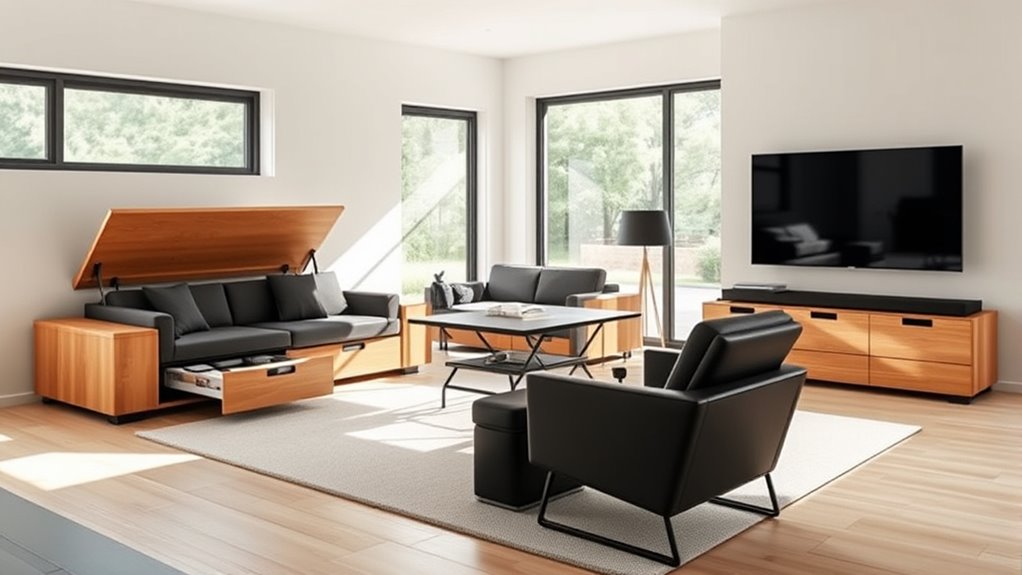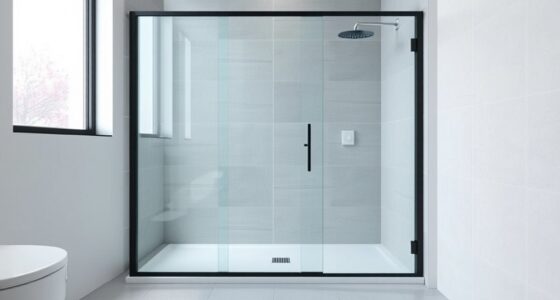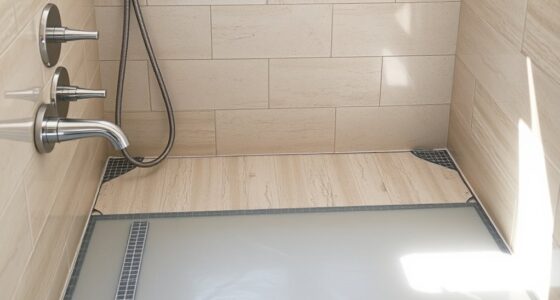Leveraging modular furniture lets you easily customize your space to fit changing needs and lifestyles. With adaptable components, you can reconfigure layouts for work, relaxation, or entertaining without hassle. Space-saving designs help you maximize small areas and keep clutter at bay. Plus, integrating smart technology can make adjustments even simpler. If you want to discover how to boost your environment’s flexibility and style, there’s more to explore on how modular systems revolutionize modern living.
Key Takeaways
- Modular furniture allows easy reconfiguration to adapt spaces for different functions and changing needs.
- Customizable components enable personalization, ensuring furniture fits evolving styles and requirements.
- Reconfigurable systems facilitate seamless transitions between lounge, work, and social areas.
- Space-saving, multi-functional modules optimize small spaces, reducing clutter and maximizing utility.
- Integration of AI and automation enhances responsiveness and simplifies adjustments for versatile use.

In today’s fast-paced world, flexibility in your living and working spaces is more important than ever. You need furniture that adapts to your changing needs, making your environment more functional without sacrificing style. That’s where modular furniture comes into play, offering innovative solutions that prioritize versatility and efficiency. With space saving solutions at the core of their design, modular pieces help you maximize every inch of your space, whether it’s a small apartment, a home office, or a busy commercial setting. These systems are designed to be rearranged, expanded, or reconfigured, giving you the power to tailor your environment to your current requirements.
One of the standout features of modular furniture is the ability to customize your designs. You aren’t stuck with one static layout; instead, you can select components that fit your specific needs and aesthetic preferences. Want a sofa that doubles as a guest bed? Or a shelving unit that transforms into a workspace? Customizable designs make these possibilities a reality. This flexibility means you can create a cohesive look that reflects your personal style while maintaining practical functionality. You can add or remove modules as your needs evolve, ensuring your space remains relevant and efficient over time.
Modular furniture offers customizable designs that adapt to your evolving needs and style preferences.
Using modular furniture, you can effortlessly switch from a cozy lounge area to a productive home office without investing in new pieces. For example, modular desks and shelving units can be combined to create a dedicated workspace that easily adapts to different tasks. When friends visit, you can reconfigure your seating or storage solutions to accommodate more people comfortably. The ability to adapt your furniture on the fly eliminates the need for bulky, single-purpose furniture that quickly becomes obsolete. Plus, many modular systems are designed to be lightweight and easy to move, so you can change your layout as often as you like without hassle.
Another advantage is that modular furniture often encourages a clutter-free environment. By choosing pieces that serve multiple functions and can be stored away or reconfigured, you reduce the need for excess furniture and clutter. This contributes to a cleaner, more organized space that feels open and inviting. If you’re working with a limited area, space saving solutions through modular designs become invaluable, allowing you to make the most of your environment without sacrificing comfort or style. Plus, the ability to personalize your setup means you can create a space that truly feels like your own, enhancing both productivity and relaxation.
Furthermore, integrating AI and automation into furniture design can enhance the functionality and adaptability of modular systems, making them even smarter and more responsive to your needs.
Frequently Asked Questions
How Do Modular Pieces Affect Overall Room Acoustics?
Modular furniture impacts your room acoustics by influencing sound reflection and absorption. When you use soft, fabric-covered pieces, they absorb sound, reducing echoes and improving clarity. Conversely, hard surfaces reflect sound, which can cause unwanted noise. By thoughtfully arranging modular units, you can control acoustic absorption and reflection, creating a balanced environment that enhances sound quality and minimizes disturbances. This flexibility helps tailor your space for ideal acoustic performance.
Are Modular Furniture Options Environmentally Sustainable?
Yes, modular furniture options can be environmentally sustainable. By choosing pieces made from eco-friendly materials, you reduce your carbon footprint. Look for options with recyclable components, so they can be reused or repurposed at end-of-life. This approach not only minimizes waste but also supports sustainable practices. You make a positive impact on the environment by selecting modular furniture designed with sustainability in mind, ensuring your space is both functional and eco-conscious.
What Maintenance Is Required for Modular Furniture?
Think of maintaining modular furniture like caring for a trusted sidekick. You’ll want to follow cleaning protocols suited to its material durability, ensuring it stays in top shape. Regular dusting and wiping prevent buildup, while occasional checks for loose fittings help keep everything secure. By staying proactive, you’ll extend its lifespan and keep your space looking fresh and functional—like a well-oiled team working seamlessly together.
Can Modular Furniture Be Customized for Specific Needs?
Yes, you can customize modular furniture for your specific needs. You choose from various material options like wood, metal, or fabric to match your style and functionality. With custom design options, you can modify sizes, shapes, and configurations to fit your space perfectly. This flexibility guarantees that your furniture adapts to changing requirements, making your environment more efficient and personalized without sacrificing ease of assembly or future adjustments.
How Does Modular Furniture Impact Property Resale Value?
Modular furniture can positively impact your property’s resale value by enhancing its appeal to potential buyers. Its flexibility allows for customizable spaces, making your property more attractive and functional. When buyers see versatile furniture, they perceive the space as modern and practical, increasing overall property appeal. This adaptability can lead to quicker sales and potentially higher offers, ultimately boosting your resale value.
Conclusion
By embracing modular furniture, you open a world where space dances to your tune, shifting effortlessly like a melody in motion. It’s your canvas, ready to adapt as your needs change, turning static rooms into vibrant expressions of versatility. With each piece fitting snugly into the next, you orchestrate a harmony of function and style. So, let your space breathe and evolve—because with modular furniture, flexibility isn’t just a goal; it’s your rhythm.









